88% of executives believe customers are changing faster than their companies can adapt. You have three solutions – accept the fact, do nothing about it, or adapt.
In this guide, we’ll explain what CRM means, how it works, and why it’s crucial for businesses of different sizes and industries.
Whether you're new to CRM or want to upgrade your current setup, this article will make you understand it all.
What does CRM (customer relationship management) mean in business?
Customer Relationship Management (CRM) is a strategy organizations use to analyze and process customer interactions.
The primary goal of CRM is to create better business relationships, speed up processes, and drive high customer satisfaction and retention.
What does a CRM system do?
The most popular features of CRM include:
- Customer data management: collect and organize customer information, including contact details, communication history, and purchase behavior
- Sales management: track sales leads, opportunities, and sales pipelines to improve forecasting and sales results
- Marketing automation: automate email marketing campaigns, segment audiences according to different criteria, and optimize sales and marketing campaign performance
- Customer support: offer more powerful customer service and resolve complaints immediately
- Analytics and reporting: generate actionable insights through data analysis to learn about customer behavior and measure performance.
CRM systems can do much more than that. Often, they include native integrations with other business apps, making them even more helpful for businesses.
Why does your business need a CRM system?
There are many good reasons for implementing a CRM in your business, including:
Building better customer relationships
According to BPM Trends, 72% of European business executives believe improved business processes lead to higher customer satisfaction. With a CRM, you can centralize customer data and gain deeper insights into your customers. It provides access to up-to-date information for your sales and support teams in a single location.
More powerful communication
CRMs drive a 56.9% improvement in communication between sales reps and managers by keeping all interactions in one place. Having real-time collaboration between departments helps align them. When communication flows smoothly, customer inquiries are handled quicker – reducing response times and improving overall customer satisfaction.
Increased efficiency
Time is something most businesses can’t afford to waste. With 70% of companies already using tools to simplify their workload, a CRM takes it a step further. Instead of getting lost in the daily grind of follow-ups and organizing contacts, a CRM handles it for you. This gives your team more time to focus on building relationships and closing deals – without the extra work.
Cost cutting
75% of business management software users cite cost reduction as a primary reason for implementation. Using a CRM reduces the manual labor that consumesyour resources by automating routine tasks and business operations. The right CRM can directly increase your business’s profitability by optimizing your workflows and minimizing wasted effort.
Boosted sales forecasting
Only 45% of sales leaders feel confident in their organization’s sales forecasts.
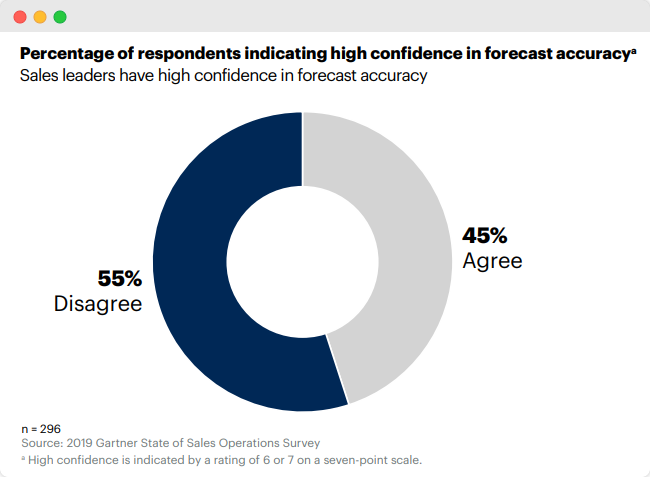
A CRM provides a clearer view of sales performance, pipeline activity, and customer behavior, making it easier to predict revenue and set accurate targets.
You can adjust strategies based on real-time data with a data-driven approach to sales forecasting.
Customer relationship management systems use cases
If you're new to CRM systems, here are some of the primary use cases:
#1 - Operational CRM
Focused on streamlining operations, operational CRMs handle all the day-to-day tasks. Automating repetitive processes like managing customer data and tracking leads frees your sales reps to focus on conversions. It’s ideal for businesses that need efficiency in handling customer interactions without manual effort.
#2 - Analytical CRM
For businesses that thrive on data, analytical CRMs are essential. These tools dig into customer behavior, preferences, and patterns, providing actionable insights. The analytical CRM allows you to make data-driven decisions based on customer loyalty or which products resonate most.
#3 - Collaborative CRM
When different teams need to stay in sync, a collaborative CRM keeps everyone connected. It centralizes customer information across departments so that marketing, sales, and support have a unified view. This type of CRM is used to improve internal communication and keep customer information secure.
#4 - Campaign management CRM
Campaign management CRMs focus on data-driven marketing. They help businesses plan, execute, and optimize marketing campaigns based on customer insights. Through segmentation and personalization, these CRMs ensure your campaigns target customers with the right message.
#5 - Strategic CRM
For businesses looking to align their sales and marketing around customer needs, strategic CRMs provide a long-term view. They gather data about customer behavior and market trends, allowing companies to tailor their strategies and reduce acquisition costs.
#6 - Sales CRM
A sales CRM gives your team a thorough understanding of the sales pipeline – making it easier to close deals. With tools to prioritize leads and monitor progress, sales reps can focus on high-value opportunities and stay organized throughout the sales process.
#7 - Customer service CRM
Customer service CRMs are built to manage support requests and interactions, ensuring every customer issue is logged and tracked. They help businesses provide consistent, timely support.
#8 - Small business CRM
Small business CRMs offer essential CRM features without overwhelming complexity. Designed for smaller teams, they help with customer management and data tracking. This type of CRM balances simplicity with functionality, helping smaller businesses operate as efficiently as possible.
Who can benefit from customer relationship management solutions?
CRM systems can support various industries and companies of all sizes in managing customer relationships.
Let’s break it down based on the business types and specific industries:
Business type:
Startups
Startups need to move quickly and make the most of every customer interaction. CRMs, in this context, help capture and manage early-stage data, ensuring leads don’t slip away. With limited resources, startups use CRMs to maximize opportunities, offering a lean yet powerful tool for building long-term customer relationships from the ground up.
Small businesses
Small businesses face constant task juggling. CRMs help track interactions, manage follow-ups, and simplify the sales process. They offer an affordable solution to stay on top of customer relationships without missing out on potential sales opportunities, perfect for businesses operating on tight budgets.
Did you know? 9% of small businesses are planning to implement CRM this year.
Mid-size businesses
As companies grow, managing increasing customer data becomes essential. Mid-size businesses use CRMs to streamline operations across expanding sales teams, allowing for detailed customer tracking, relationship building, and maintaining loyalty as their customer base scales. CRMs in this category often have enhanced features for scaling businesses, such as advanced reporting and sales forecasting.
Large-scale growth businesses
For larger companies, cross-team coordination matters the most. CRMs help align marketing, sales, and support departments, offering comprehensive customer views and seamless data flow. These businesses rely on CRMs to manage complex sales pipelines and customer interactions across multiple teams and channels.
Industries:
Professional services
Lawyers, consultants, and accountants benefit from CRMs to track client communication and project progress. These tools help manage case details, deadlines, and deliverables, ensuring every client interaction is logged and followed up..
Hotels & hospitality

CRM systems allow hotels and restaurants to track customer preferences and booking history, creating personalized guest experiences. A well-implemented CRM can be a powerful tool for building customer loyalty and ensuring guests feel valued and appreciated. This is why hotels increasingly adopt CRM solutions, with approximately 20% of hotels worldwide using some form of CRM system.
IT & technology
Tech companies often deal with lengthy sales cycles and highly technical customer interactions. CRMs help them stay on top of sales leads, support tickets, and complex client communications, making it easier to manage ongoing relationships.
Schools
While CRMs are often associated with sales and marketing, they can be equally valuable in other industries. For example, educational institutions use CRMs to track interactions with students and parents, manage admissions, and handle inquiries.
Architects
Many CRMs also include project management features, making them invaluable tools for architects who need to track project progress, manage deadlines, and collaborate with team members. With a CRM, architects can centralize client information and improve external communication.
Real estate

Real estate agents juggle many client interactions, and a CRM stores property listings, leads, and follow-ups. A CRM can be equally helpful for property managers and investors who need to track rental properties, tenant information, and financial performance.
The growing popularity of real estate CRM software is reflected in the market size, which is expected to reach USD 10,603.01 million by 2032.
Travel and tourism
CRMs in travel and tourism focus on creating personalized customer experiences. Using booking history, travel preferences, and inquiries, agencies can tailor-make trips and offer exclusive deals. This is why it’s so essential for travel and tourism companies to have a CRM system that centralizes customer information and enables personalized interactions.
Accountants
Accountants use CRMs to track client communication, deadlines, and financial documentation, such as tax filings. With so much paperwork involved, accountants praise CRMs for centralizing everything in one place, making it easier to manage multiple clients efficiently.
Legal
Law firms use CRMs to track ongoing cases, appointments, and client communication. Legal CRMs are often used to handle sensitive information, as well as secure case management and coordination between lawyers and clients. These systems focus on securely managing case files and supporting complex legal proceedings.
Construction

In the construction industry, CRMs manage client relationships, project timelines, and communication with stakeholders like contractors, clients, and suppliers. Construction companies rely on these systems to track multi-phase projects. With the global construction software market projected to grow from USD 9.87 billion in 2024 to USD 21.04 billion by 2032, technology will play a huge role in avoiding costly delays.
Recruitment
Recruitment agencies use CRMs to organize large volumes of candidate data, tracking applications, interviews, and placements. These systems ensure recruiters can match qualified candidates to the right roles quickly. Recruitment CRMs specialize in managing the entire candidate pipeline, from sourcing to placement, helping agencies easily handle high volumes of talent data.
Manufacturers
Manufacturers rely on CRMs to manage relationships across the supply chain – including distributors, suppliers, and customers. They use CRMs to handle the complex logistics of tracking large volumes of orders, controlling inventory levels, and providing timely deliveries.
How to choose the best CRM software for your needs?
CRM software should be chosen based on what works for your business, not what is popular. To get there, you should ask yourself a few critical questions.
Question one: What’s the size of your business?
Are you a small startup or an established company with a large team? Different CRMs cater to various business sizes – some are designed for the agility of small businesses, while others are built to manage the complexities of larger teams. The size of your business will guide the CRM features you need.
If you're a startup or small business, opt for a CRM that can scale with you. You may not need all the bells and whistles right away, but you should choose a platform that grows with your business.
For example, Capsule CRM offers a free plan for startups to help them manage time, customers, and sales as they grow. As your team expands, you can easily upgrade to a paid plan to unlock advanced features.
Learn more about how Capsule CRM supports startups, small, medium-sized, and large-scale growth businesses.
Question two: Do you need CRM for marketing too?
Are you just looking to manage customer data for sales, or do you need marketing tools as well? Some CRMs combine both sales and marketing functions, allowing you to monitor customer interactions across departments, while others focus solely on sales. The right choice depends on whether you want an all-in-one platform or a specialized tool.
Capsule CRM goes beyond just sales management by offering marketing automation as well. With the Transpond add-on, you can run engaging email campaigns directly from Capsule CRM – connecting your sales and marketing efforts by tracking leads and interactions in one platform.
If that’s not enough, Capsule CRM also integrates with tools like Mailchimp and Leadinfo to help you generate leads and build targeted mailing lists. Using the reporting tools, you can get valuable insights into the results of your marketing campaigns.
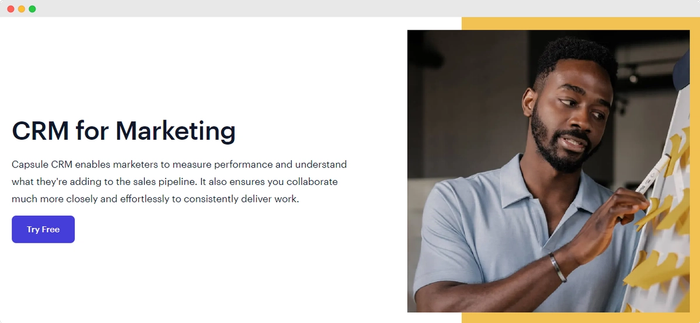
Read more about our CRM features for marketing.
Question three: Do you need cloud-based or on-premise?
Would you rather access your CRM from anywhere (cloud-based) or install it on your servers (on-premise)? Cloud-based CRMs are ideal for remote teams, while on-premise solutions may offer more control over your data.
In general, cloud-based systems require fewer changes and maintenance, while on-premise solutions tend to be more customized yet expensive.
Capsule CRM is entirely cloud-based, allowing your team to access it from anywhere with an internet connection – perfect for all teams. With no need for server maintenance or manual software updates, you can focus on your business while the technical side is handled. If flexibility and ease of access are top priorities, Capsule is a great choice.
Question four: How much automation do you need?
Do you want a CRM that automates tasks like follow-ups and data entry, or would you instead manage things manually? If your goal is to save time, automation can help you achieve it.
Start with small automation steps. Automating too much too quickly can overwhelm your team. Focus on the most time-consuming tasks first, and gradually scale up as your team gets comfortable.
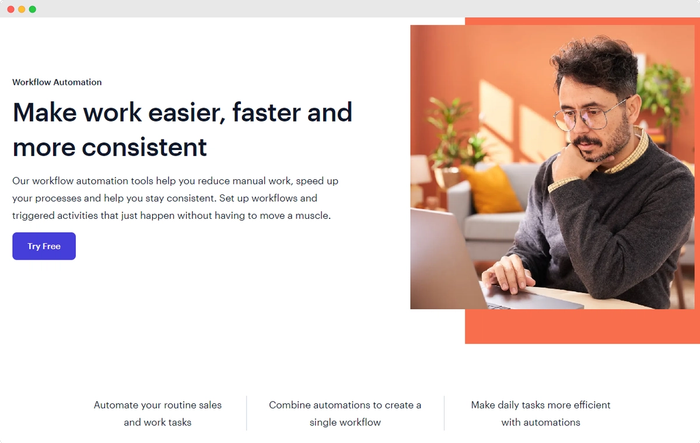
Capsule CRM automates routine tasks like follow-ups and moving deals through your sales pipeline. You can set up workflows to handle repetitive tasks automatically, like triggering activities, assigning tasks, or progressing deals – all without manual input. Capsule’s automation isn’t limited to sales! It also supports project management, helping you facilitate various processes in your company.
Learn more about it here.
Question five: How tech-savvy is your team?
Is your team comfortable with new technology or prefer something more straightforward? A CRM that’s too complex might frustrate your sales professionals, while one that’s too basic may not meet all your needs. You have to strike the right balance between usability and functionality.
Involve your team in the decision-making process. Gather their input on which features they find helpful and test a few platforms before committing.
Capsule CRM is designed with simplicity in mind, making it user-friendly regardless of your team’s tech skills. Its intuitive interface ensures your team can get up and running quickly without feeling overwhelmed, offering functionality without complexity.
Question six: What integrations do you need?
Do you already use tools like email marketing platforms, accounting software, or e-commerce systems? Ensure your CRM can integrate with these so all your tools can communicate and keep your data in sync.
Before choosing a CRM, create a list of must-have integrations. This will help you quickly rule out tools that don’t fit into your existing tech stack.
Why struggle with disconnected tools when Capsule CRM brings them all together?
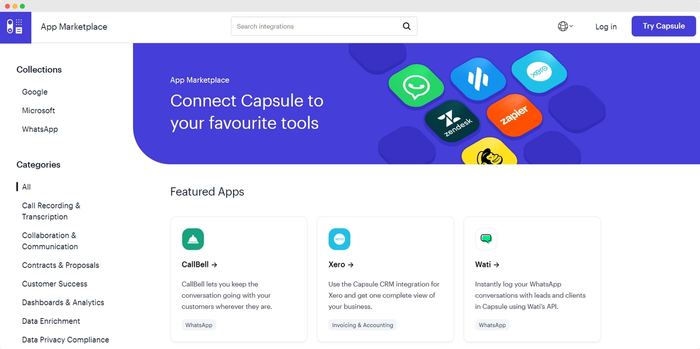
Capsule CRM integrates with accounting software like Xero and QuickBooks to keep your financial data in sync. Additionally, it integrates with Mailchimp and Transpond for email marketing campaigns. You can also automate tasks and connect with other apps using Zapier and Make, and it’s compatible with both Google Workspace and Microsoft 365.
That's not all! Check out all of the integrations.
Question seven: What’s your sales process like?
Is your sales cycle quick and straightforward, or are deals more drawn out and complex? Some CRMs are optimized for fast transactions, while others are designed to handle longer, multi-step sales processes. Understanding your sales flow will help you choose the right CRM for your business.
Before selecting a CRM, map out your sales pipeline. This will help identify bottlenecks and areas where a CRM can provide the most value.
Capsule CRM allows you to fully customize sales pipelines to reflect the stages that match your team’s workflow. It manages each deal by guiding it through the pipeline and automatically assigning tasks as needed. Capsule lets you set up custom milestones for more intricate sales processes that align with each phase.
Question eight: What kind of customer support do you expect?
How much support will you need from your CRM provider? Some offer 24/7 phone and live chat, while others rely on self-service options like a knowledge base. Ensure the support level matches your comfort and needs, especially when something goes wrong.
Check customer reviews to gauge the responsiveness of the provider’s support team. Also, inquire about training materials or onboarding services to ensure you get up to speed quickly.
Capsule’s support team is readily available to answer any questions via messaging. For those looking for self-service, there is a comprehensive knowledge base covering everything from setup to advanced features. Various video tutorials are available to help you learn how to use CRM, too.
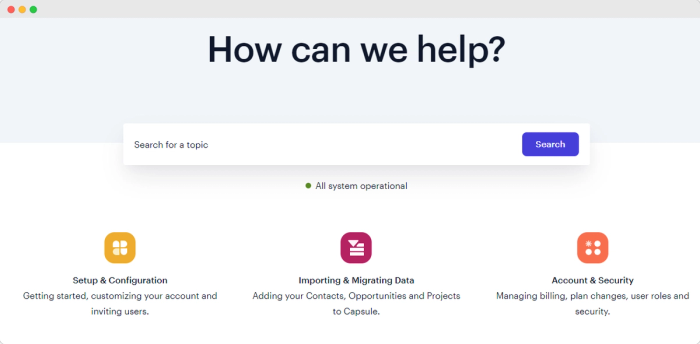
Take a look at our support materials and video tutorials.
Question nine: What’s your budget?
How much can you realistically spend on a CRM? Some tools are free or offer affordable plans for smaller businesses, while others can get expensive with advanced features – sometimes reaching a few thousand dollars per month. Be mindful of what you can afford without overextending your budget!
Don’t just focus on the monthly fee – consider hidden costs like setup, training, or future upgrades when advanced features become necessary.
With a free plan that allows up to two users and 250 contacts, Capsule CRM is easily accessible to startups and small businesses. With paid plans, users can access advanced features such as multiple sales pipelines, project management, and custom reporting. The platform has no setup fees, and you can try it free for 14 days before committing.
Question ten: How necessary is customization?
Do you need a CRM that can adapt to your business processes, or are you okay with an out-of-the-box solution? If your business has unique workflows, a customizable CRM is what you might be looking for.
Opt for a CRM that allows easy customization without requiring a developer. Look for drag-and-drop interfaces for workflows and dashboards, especially if your team isn’t highly technical.
Capsule CRM offers flexible customization options, like creating custom fields to track specific data and adjusting sales pipelines with personalized milestones.

You can also apply custom branding, adding your logo and tweaking the color scheme to align with your brand identity. Capsule lets you set up custom task categories, lists, and activity types to match your business’s processes better!
Read more about CRM customization.
CRM Best Tactics Most Teams Learn Too Late
Most CRM advice sounds reasonable. Define your goals. Keep your data clean. Track your pipeline.
And yet, many teams still feel like their CRM is something they maintain rather than something that actively helps them sell, support customers, or make better decisions. It becomes a system people update out of obligation, not because it genuinely improves their work.
That usually isn’t a tooling problem. It’s a usage problem.
The strongest CRM setups don’t just store information. They shape behavior, remove friction, and make it easier for teams to do the right thing consistently. The seven best practices below focus on that reality — how CRMs actually succeed or fail in day-to-day use.
Build your CRM around how customers actually buy
Most CRMs are structured around internal logic: lead created, deal opened, proposal sent, deal closed. These steps are tidy and familiar, but they’re rarely how customers experience buying.
Real buying journeys are messy. Customers pause, revisit options, loop in new stakeholders, go quiet, and come back later with different questions. When your CRM forces deals into rigid stages, updates start to feel inaccurate or artificial.
The fix is to start outside the CRM. Map how customers really move from first touch to decision. Look at where deals stall, where objections surface, and where momentum is usually gained or lost.
Once you understand that flow, design stages, fields, and required actions around those moments. This makes updates feel honest rather than performative. It also gives managers clearer insight into what’s actually happening, not just what stage a deal is labeled as.
When a CRM reflects real customer behavior, teams trust it more — and trust is what turns a CRM into a decision-making tool instead of a reporting exercise.
Make the CRM the single source of truth (and actually enforce it)
Many teams say their CRM is the source of truth. In practice, that truth is often scattered across inboxes, Slack threads, call recordings, and personal notes.
This fragmentation creates constant friction. People double-check details, ask questions that should already be answered, or make decisions based on incomplete context. Over time, confidence in the CRM erodes.
To fix this, the rule must be clear and consistent: if information matters, it belongs in the CRM. That includes deal context, key conversations, risks, and next steps — not just surface-level fields.
This doesn’t mean dumping raw data into the system. It means summarizing what someone else would need to understand the situation without chasing you down. When people know the CRM contains the full picture, they stop working around it.
A CRM becomes valuable not when it’s full, but when it’s trusted.
Optimize for speed of use, not perfect data
One of the fastest ways to hurt CRM adoption is to demand too much information too early. Overly complex forms and mandatory fields turn simple updates into a chore.
When users feel slowed down, they rush entries, guess values, or skip updates entirely. The data might look complete, but it’s often unreliable.
Instead, design your CRM to be quick and forgiving. Capture only what’s essential at each stage, and let additional detail come later when it’s actually known. This lowers resistance and improves accuracy at the same time.
Regularly review your fields and ask a simple question: does this help someone make a decision? If the answer is no, it probably doesn’t belong there.
A CRM that’s fast to update will always outperform one that’s theoretically perfect but practically avoided.
Align incentives with CRM behavior
No amount of documentation or training will fix misaligned incentives. People naturally focus on what they’re rewarded for.
If compensation and recognition are tied only to closed deals, CRM quality becomes secondary. Updates get rushed, risks go unrecorded, and forecasts become optimistic rather than accurate.
Alignment doesn’t have to be heavy-handed. Small signals matter. Reviewing pipelines directly from the CRM, pushing back on deals with no context, or calling out strong CRM usage in meetings all reinforce expectations.
When leadership visibly relies on CRM data to make decisions, teams follow suit. The system becomes a shared reference point rather than a compliance task.
Behavior follows incentives — and incentives (see, e.g., ZenBusiness) quietly shape the health of your CRM. Make the CRM part of daily work, not “end-of-day admin”.
CRMs struggle when they’re treated as something you update after the real work is done. That framing turns the system into overhead.
High-performing teams flip this entirely. They use the CRM during their work, not as a summary of it. Conversations, reviews, and planning all start inside the system.
That might mean pipeline reviews run directly from CRM views, or one-on-ones guided by deal notes and activity history. Forecast calls rely on CRM data, not manually assembled slides.
This approach removes duplication. It also ensures the CRM stays current because it’s being used in real time. Updates feel purposeful instead of administrative.
When the CRM becomes the place where work happens, adoption takes care of itself.
Use your CRM to surface risk, not just opportunity
Most teams use their CRM to focus on upside: large deals, fast-moving opportunities, and best-case forecasts. While that’s useful, it’s only half the picture.
The real leverage often comes from spotting problems early. Deals with no activity, customers going quiet, or close dates that keep slipping are all warning signs hiding in plain sight.
A good CRM setup makes these signals easy to see. Custom views, alerts, and dashboards should highlight stagnation and risk, not just momentum.
This shifts conversations from reactive to proactive. Instead of asking why something was lost, teams can intervene while there’s still time to change the outcome.
Preventing a loss is often more valuable than chasing the next win — and your CRM should support that mindset.
Give the CRM a clear, accountable owner
CRMs rarely fail because of bad software. They fail because no one is clearly responsible for them.
When ownership is vague, the system slowly degrades. Extra fields get added, workflows multiply, and outdated processes stick around because no one feels empowered to remove them.
A healthy CRM needs a business owner — not just IT — who understands how teams actually work. This person sets standards, gathers feedback, and decides what belongs in the system and what doesn’t.
They also protect the CRM from bloat. Saying “no” is just as important as adding new features or fields.
Clear ownership keeps the CRM aligned with reality as the business grows and changes.
Using a CRM is easy. Benefiting from it is harder.
Most teams technically use their CRM. Fields are filled. Deals move. Reports exist.
The teams that truly benefit from their CRM go further. They design it around real behavior, keep it lightweight, and integrate it into everyday decisions.
When done right, a CRM stops feeling like something you have to maintain. It becomes something you’d struggle to work without.
Connect your CRM to growth loops, not just sales workflows
CRMs often stop at revenue tracking: leads, deals, customers, renewals. What’s frequently missing is visibility into how growth actually compounds after the sale.
Referrals are a good example. Many teams run referral programs in parallel to their CRM, treating them as a marketing side project rather than a core growth channel. Tools like ReferralCandy generate valuable signals — who your happiest customers are, who actively advocates for you, and which segments drive word-of-mouth growth.
When this information lives outside the CRM, it’s underutilized. Sales teams don’t know which customers are strong advocates. Account managers miss opportunities to nurture promoters. Leadership loses sight of how referrals influence pipeline quality and lifetime value.
The same disconnect often appears in financial workflows. When billing, approvals, and payment status live outside the CRM, revenue visibility becomes fragmented. Integrating systems like Rillion automated invoicing software closes that loop. It connects deal data to real payment behavior, shortens feedback cycles between sales and finance, and prevents revenue conversations from relying on spreadsheets or assumptions.
What is the best CRM platform for small businesses?
Capsule CRM is an excellent choice for small businesses, offering ease of use, flexibility, and the ability to scale as your company grows. It’s designed for small teams who want to stay organized without getting bogged down by overly complex systems.
Capsule keeps all customer data in one place, helps manage sales leads, and strengthens customer relationships. With affordable pricing and features like custom fields, automation, and integrations with popular tools, Capsule fits the needs of growing businesses.
Interested in what users are saying? Check out the G2 reviews.

Don’t wait – give Capsule CRM a try today or explore the free plan.
Conclusion
CRM's meaning in business can shift depending on the needs and scale of your company, but one thing is certain – managing customer relationships effectively is a must-have for growth. You can nail customer relations with a well-chosen CRM system.
Want to experience it firsthand? Capsule CRM offers a 14-day free trial to help you get started!




